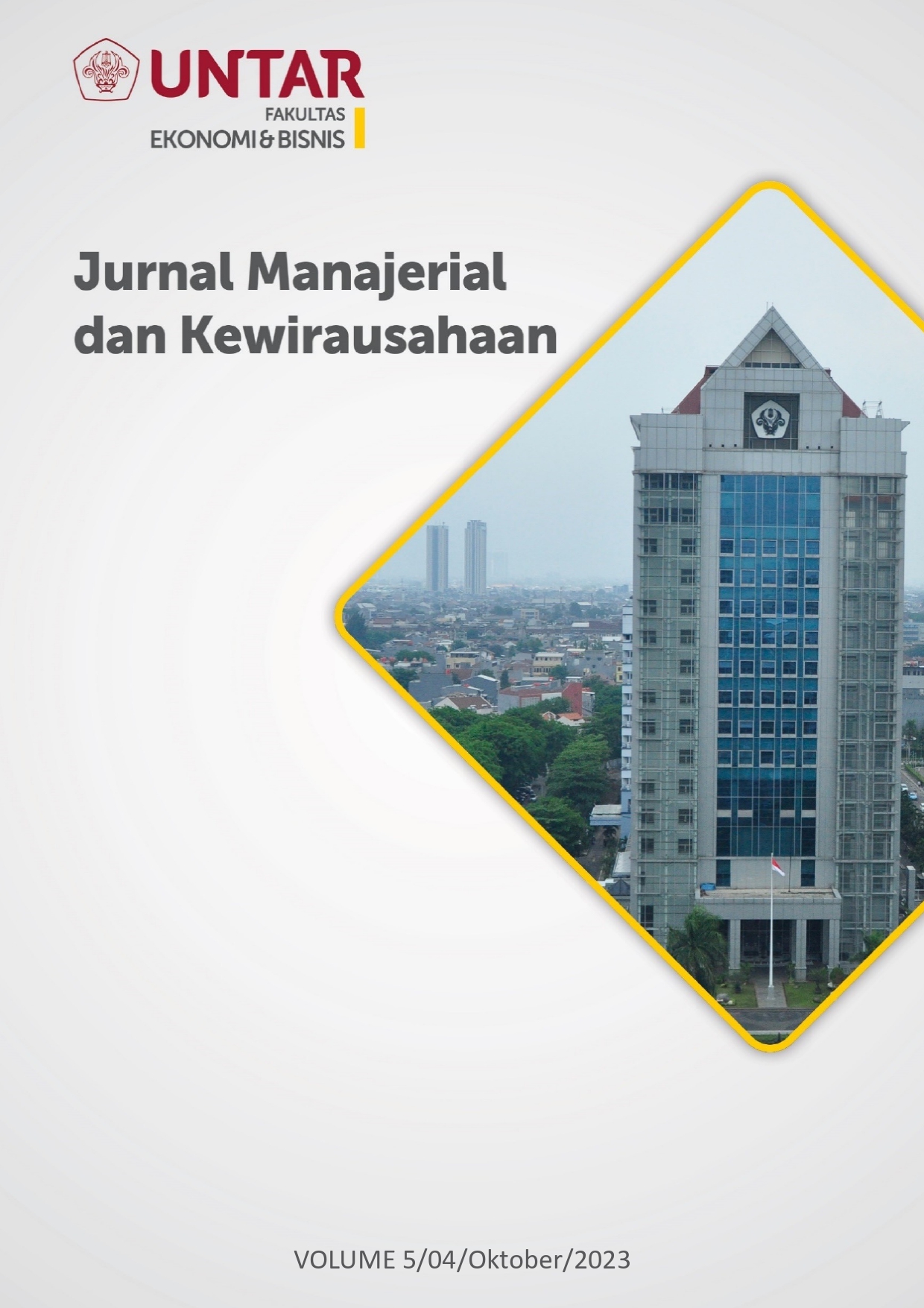Pengaruh Kepribadian, Motivasi, dan Pendidikan Kewirausahaan terhadap Niat Berwirausaha Mahasiswa Universitas Tarumanagara
Main Article Content
Abstract
The purpose of this study was to determine the effect of personality, motivation, and entrepreneurship education on the entrepreneurial intentions of students of the Faculty of Economics and Business, Tarumanagara University. The sample of this research is students of the Faculty of Economics and Business, Tarumanagara University. The sample was selected by purposive sampling method amounting to 100 respondents. Questionnaires were distributed online using the Google form. The results of the data obtained were then processed using SmartPLS 4. The results of this study showed that personality had a positive and significant effect on entrepreneurial intentions, motivation had no positive and significant effect on entrepreneurial intentions, and entrepreneurship education had a positive and significant effect on entrepreneurial intentions.
Article Details
Section

This work is licensed under a Creative Commons Attribution-NonCommercial-ShareAlike 4.0 International License.
This work is licensed under a Jurnal Muara Ilmu Ekonomi dan Bisnis Creative Commons Attribution-ShareAlike 4.0 International License.,/p>
References
Abdillah, W. & Hartono, J. (2015). Partial Least Square (PLS): Alternatif Structural Equation Modeling (SEM). Yogyakarta: Andi.
Andreas Wijaya. (2019). Metode Penelitian Menggunakan Smart PLS 03. Yogyakarta: Innosain.
Arikunto, S. (2019). Prosedur Penelitian. Jakarta: Rineka cipta.
Fayolle, Alain & Benoit Gailly. (2015). The Impact of Entrepreneurship Education on Entrepreneurial Attitudes and Intention: Hysteresis and Persistence. Journal of Small Business Management 53(1):75–93., https://doi.org/10.1111/jsbm.12065
Ginting, N. (2015). Manajemen Pemasaran. Bandung: Yrama Widya.
Ghozali, Imam, Hengky Latan. (2015). Konsep, Teknik, Aplikasi Menggunakan Smart PLS 3.0 Untuk Penelitian Empiris. BP Undip. Semarang.
Indahsari, L. & Puspitowati, I. (2021). Pengaruh Pendidikan Kewirausahaan dan Efikasi Diri terhadap Intensi Wirausaha Mahasiswa Universitas Tarumanagara. Jurnal Manajerial dan Kewirausahaan, 3(1), 267-276. https://doi.org/10.24912/jmk.v3i1.11320
Kesrasetda. (2020). Pengembangan Jiwa Kewirausahaan/Entrepreneurship di kalangan generasi muda. Kesrasetda Bulelengkab.
Kompas. (2022, April13). Lulusan Perguruan Tinggi Mulai Diserap Pasasr Retrieved from https://www.kompas.id/baca/telaah/2022/04/13/lulusan-perguruan-tinggi-mulai-diserap-pasar.
Mahanani, E. & Sari, B. (2017). Faktor faktor yang mempengaruhi minat berwirausaha mahasiswa Fakultas Ekonomi Universitas Persada Indonesia Y.A.I. Jurnal Sosial & Humaniora IKRA-ITH,2(1), 31-40.
Medyanto Pangestu. (2020). Pengaruh Promosi Terhadap Intensi Masyarakat Menjadi Nasabah Bank Syariah (Studi Kasus Pada Masyarakat Kecamatan Cengkareng, Jakarta).
Natalita, C. & Slamet, F. (2019). Pengaruh Latar Belakang Keluarga, Kepribadian, dan Efikasi Diri terhadap Intensi Berwirausaha Mahasiswa. Jurnal Manajerial dan Kewirausahaan, 1(4), 778-787. https://doi.org/10.24912/jmk.v1i4.6564
Rahmawati, Hikmah Is’ Ada. (2013). Pengaruh Good Corporate Governance (GCG) Terhadap Manajemen Laba Pada Perusahaan Perbankan. Accounting Analysis Journal AAJ 2 (1).
Rosmiati, Donny Teguh Santosa Junias, Munawar. (2015). Sikap, Motivasi, dan Minat Berwirausaha Mahasiswa., Vol. 17, No. 1, 21–30. https://doi.org/10.9744/jmk.17.1.21–30.
Silaen, Sofar. (2018). Metodologi Penelitian Sosial Untuk Penulisan Skripsi dan Tesis. In Media, Bandung.
Soelaiman, L., Puspitowati, I., & Selamat, F. (2022). Peran Model Panutan terhadap Intensi Berwirausaha Mahasiswa Melalui Penerapan Teori Perilaku Terencana. Jurnal Muara Ilmu Ekonomi dan Bisnis, 6(2), 320-329. https://doi.org/10.24912/jmieb.v6i2.20387
Sugiyono. (2017). Metode Penelitian Kuantitatif, Kualitatif, dan R&D. Bandung: Alfabeta, CV.
Sugiyono. (2018). Metode Penelitian Kuantitatif. Bandung: Alfabeta.
Sugiyono. (2019). Metode Penelitian Kuantitatif, Kualitatif, dan R&D. Bandung: Alphabet.

